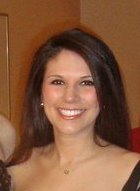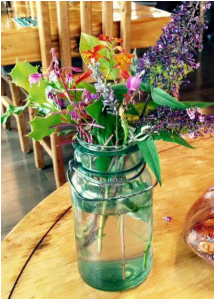
I have witnessed and experienced un-sustainable lives - ways of life that are not healthy and that cannot sustain one's being over time. My sweet and brave daughter, Julie, has experienced such a life herself, suffering with an eating disorder for seven years, and has offered to share her story with you - and to share information about how we can advocate for research that can help prevent and treat eating disorders. Here is Julie's story, in her own words - she has shared this with many young people in high school and college:
I want to begin by sharing a story with you all – a story about a shy little girl who spent her free time dreaming about all of life’s wonderful plans and possibilities – a little girl who was quite confident that these hopes and wishes would come true. She loved everything beautiful from silver sparkle jellies and bright pink nail polish to princess Halloween costumes and dress up clothes her mom had secretly bought at Goodwill. She built a pretend office in her walk-in closet to play secretary with her best friend Natalie and she set up three dollhouses on the dining room table, spending hours rearranging furniture and making up stories about the lives of her families. This little girl had an endless amount of creativity and motivation and never once questioned whether or not her dreams would come true. This little girl was me.
Flash forward to late middle school and early high school. The little girl I once was began to fade into the background as goals took on the form of straight A’s on a report card and dreams turned into becoming valedictorian and attending an Ivy League school. My days became filled with honors classes I rarely enjoyed but had to pretend I loved and hours upon hours of homework that continued far into the night. Sleep was of little importance or so I told myself and having fun was the last thing on my list. It didn’t matter whether or not I wanted to do what I was doing; I simply had to and I knew no way out.
During the fall and winter of my sophomore year, I found an outlet for some of my stress about academics and success – a new project focused on my outward appearance. I woke up at 5:30 in the morning to flat iron my hair, I was always running late as I threw clothes around my room until I had found the perfect outfit, and I began to eat as little as I could in hopes of getting to that magic number on the scale. Now this is in no way to say that school was the sole cause of what later became a full-blown eating disorder – there were the typical family issues, the obsession with images in the media, and an overall lack of positive self-esteem – but my focus on being the perfect student certainly added fuel to the fire.
As the year progressed, I became increasingly entrenched in my rigid eating and exercise habits and spent far too much time critiquing my body in front of the mirror. Family, friends, and doctors had begun to notice my behavior and were concerned with how thin I had become. They all told me I could not lose any more weight and suggested I get some help. Yet, at the time, I could not understand what they were so worried about; it was as though they were trying to tell me I needed to stop the one thing in life that made me feel calm, the one thing I was certain I could succeed at.
However, the high of feeling in-control and powerful could not last forever. By the end of the summer, I knew that something was wrong, that I wasn’t happy, that I was always anxious, and that I had fully lost that all that desire and creativity I once had as a little girl. But stubborn as I was, I would not change what I had become and so I waited until my parents took action and decided to sign their 16-year-old daughter into treatment.
To make a long story short, as I feel the details of my time in treatment are not necessary to who I am today, I will simply say that the seven years I spent going through the revolving door of relapse and recovery was the hardest thing I have done to date. I had to hit rock bottom time and again before I realized that I was sick of being sick, that I needed to change something, and that I couldn’t do this alone. Although I didn’t know what I wanted for myself, I knew what I did not want, and that was my life the way it was with an eating disorder.
Throughout my ups and downs in treatment, one thing remained consistent: I was becoming alive again. I began to feel all kinds of emotions that I had blocked for years – anger, sadness, happiness, love. I began to notice hunger cues and cravings for so-called forbidden foods that I had denied myself of for so long. I began to have hopes and dreams again – I wanted to go back to school and to have friends and a boyfriend and a job I loved someday. I began to let down my guard and to open myself up to the possibilities life had to offer. Now I will not lie, the path to recovery is not simple or neat or ordered or anything my once OCD self thrived upon. There were highs and lows and all kinds of in-betweens – which I later learned is how everyday life is even without an eating disorder. But in spite of any pain or struggling I had to experience, the work was worth the reward.
As I speak to all of you today, I have been out of treatment for a little over a year [now two] and I can honestly say I didn’t always believe that my life as it is today would be possible. I had fought and fought for so long that I sometimes didn’t even know what I was fighting for. Yet, here I am, twenty-four years old and finally living those dreams that the little girl in me always knew I could. No, my life is not perfect; not everything is sparkly jellies and princess costumes. I was not valedictorian of my high school nor did I go straight to a top-notch school. But I am happy. Day by day, I am learning to accept my flaws, to ask for help when I cannot do it alone, and to admit that sometimes I am scared and unsure. I do not always love how I look or the way my clothes fit on my healthy self. I have my moments, although they are becoming less frequent, where I want to restrict again or run just a little bit too far. But by the end of the day or week or however long it takes, it always seems to turn out okay.
If I can leave you all with one thing today, with the most valuable thing I have learned throughout my recovery process, I want you all to know that it is okay, in fact it is perfectly wonderful, to be you, in your purest form, to follow those dreams of the little girl or boy inside of you, to live in a way that makes you happy. I agree that academics, a career, finding your ideal city, and so on, are all important things in life. We would not move forward if we never had tangible goals. But when push comes to shove, it is being true to ourselves and surrounding ourselves with people who do the same that keeps us alive. Everything else just seems to fall in place.
So that is Julie's story - and her brother Michael, her dad Tony, and I each have our own stories about those seven years. I can tell you that the prayer at the front of my mind and heart each day when I woke up and each night when I went to sleep (or tried to sleep) was about Julie - and how we could help her become whole again. She traveled her path to recovery courageously, as we walked our paths alongside her, and she came out the other side whole. As a vibrant and wise young woman of 24, Julie is well aware of what is needed to live a life of personal sustainability, of joy and strength.
Julie has been active with the National Eating Disorder Association (NEDA), organizing campus activities to educate students and working with others to plan the annual St. Louis NEDA walk to raise funds for research. If you would like more information about how to help, please visit here. If you know others who have struggled with lives that cannot sustain health and well-being, you may share her story with them. There is hope.


 RSS Feed
RSS Feed
